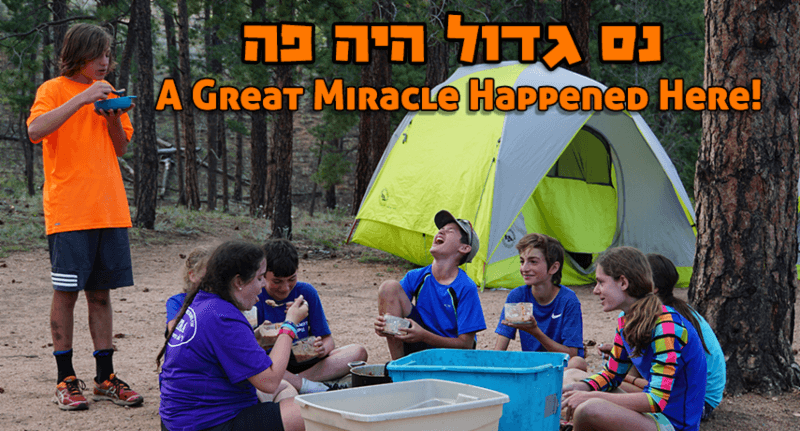As we wrap up the third week of Session 1, I sense that the simcha (joy) of our chalutzim (pioneers/campers) is as strong as ever! I can’t help but smile when I see them eagerly running to their chugim (activities), singing at the top of their lungs during musical tefillah (prayer), and jumping around during pre-dinner rikkud (dance).
This week we said, “le’hitraot!” (“see you later!”) to our Session 1A chalutzim as they returned home following an action-packed, growth-oriented two weeks. While we will miss their contribution to our kehillah (community), we also gave a warm welcome to our Session 1B chalutzim as they arrived to camp. Arriving on Tuesday, they jumped right into basecamp activities and preparing for the upcoming masa’ot (backcountry excursions).

This week was full of exciting and memorable peulot erev (evening activities). Ilanot (3rd and 4th graders) prepped for their upcoming Harry Potter Day with a relaxed movie night. Metaylim (5th and 6th graders) competed between ohelim (tents) in minute-to-win-it activities and excitedly made welcome signs for arriving new campers. Solelim (7th and 8th graders) had a tie-dye night and learned the 1978 Israeli Eurovision song, “A-Ba-Ni-Bi” in preparation for camp’s edah (age group) against edah sing-off, Kol Edah. Bogrim (9th graders) spent a peulat erev around the medurah (campfire) playing guitar, singing, and eating s’mores. Sayarim (10th graders) played bar and bat mitzvah games with Bogrim, which evolved into their own “Saya-rave.” They also did a community mapping activity in which they used natural resources to construct a physical map of camp.

This week JOLI (11th and 12th graders) had a chance to intimately experience one of Ramah in the Rockies’ core values, tzmicha ishit (personal growth), or as we like to say at camp, “challenge by choice.” JOLI chalutzim laced up their hiking boots and tackled Mount Bierstadt, a peak of over 14,000 feet! They also began CIT training, preparing to work with tzevet (staff) to run omanut (art), lead ofanayim (biking), attend activities with the younger edot (age groups), and more!

As we do each week, we had Israeli-themed activities throughout camp, including a blue and white contest at dinner, a Shulchan Ivrit (Hebrew only table) at lunch, and some Israeli tunes added to our always-growing song repertoire. We also had a terrific 4th of July celebration here at camp yesterday. Throughout the day, we danced and sang American folk songs. We said the prayer for our country, recited blessings in Hebrew, English, and Spanish, and also spoke about the values that make America the country it is. We ended the day with a 4th of July bar-b-que.
In true Ramah in the Rockies style, the weather has been keeping us on our toes! This week the chalutzim have been donning hats, slathering on sunscreen, and refilling water bottles as the sun shines strong in the mornings. By late afternoon, the sky sometimes darkens as the chava (ranch) has often been washed with much-welcomed rain, cooling off camp in time for a good night’s sleep. An added benefit of the weather patterns has been that the flowers this year are more vibrant than ever. Many chalutzim have noticed the bluish purple columbine flowers that have bloomed for the first time in recent memory. Our Ramah Valley is awash with hues of purple and orange mixed with the vibrant green of the grass.
There is something about the hours leading up to Shabbat that brings a palpable energy to the chava. I feel the buzz and excitement of chalutzim as they wash off the sweat and dirt that marks a successful day here at camp, and prepare to refocus their minds and hearts to the change of pace that Shabbat brings.
Next week the chalutzim will go off on various masa’ot and take on the outdoor adventures that makes Ramah in the Rockies so special. For now, the approaching calm of Shabbat awaits us.
Shabbat shalom,
Rabbi Eliav Bock





































 Jacob “J-Chat” Chatinover, Director of Logistics ‘Car Czar’
Jacob “J-Chat” Chatinover, Director of Logistics ‘Car Czar’ Deena Cowans, Rosh Chinuch (Director of Education)
Deena Cowans, Rosh Chinuch (Director of Education) Lexi Marcus, Rosh Ilanot (3rd and 4th grade)
Lexi Marcus, Rosh Ilanot (3rd and 4th grade) Liza Elkin, Rosh Metaylim (5th and 6th grade)
Liza Elkin, Rosh Metaylim (5th and 6th grade)

 Eli Witkin, Rosh JOLI
Eli Witkin, Rosh JOLI





